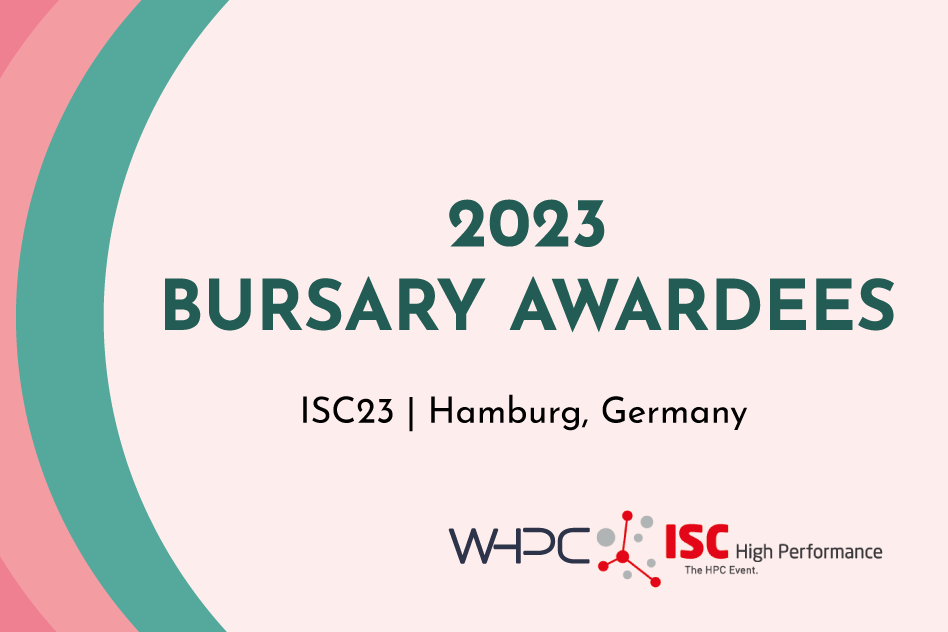Women in HPC – ISC23 Travel Awardees Announced!
Thanks to our incredible Supporters, Women in HPC is proud to announce that we have been able to award two travel bursaries to rising female leaders early in their HPC careers. Learn more about these incredible women, and be sure to attend the Early Career Poster Networking Reception on May 23rd to meet them in-person!
Stamatina Moraiti

Stamatina Moraiti, University of Sheffield
About Stamatina: My name is Stamatina Moraiti. I come from Greece, where I studied an integrated master’s in Mechanical Engineering. I am in the 3rd year of my PhD studies in the Dept. of Mechanical Engineering at the University of Sheffield, in the UK, specialising in biomechanics. I have experience in both bone and muscle mechanics and stochastic approaches combined with computational models, as well as uncertainty quantification, parameter identification and dimensionality reduction techniques. My current research interests target on dimensionality reduction of multidimensional variant bone shapes for elucidating disease and treatment effects on bone. In particular, the PhD project involves data-driven stochastic approaches applied for developing shape models of mouse tibia which describe temporal and spatial changes due to disease/ treatment progression.
Stamatina will be presenting,“Task-parallelised elastic registration of 3-dimensional mouse tibia images” at ISC23.
Abstract: Preclinical studies of murine bone models investigate the effect of osteoporosis treatments in bone geometry. Mouse bone geometry is typically extracted by using micro-Computed Tomography (mCT). Spatiotemporal variations are assessed by processing longitudinal data from multiple mice groups. Herein, in vivo mCT is used to image mouse tibiae at multiple ages belonging to disease and treatment groups. To compare similar features across all tibiae, image mapping to a reference image is accomplished via elastic registration. As this is computationally demanding, a preliminary feasibility study was firstly conducted on a desktop PC. This study investigated 22 young and old osteoporotic/ treated mice. Images at weeks 18 and 24 (of age), i.e., before and after treatment, were analysed. The analysis was limited to a middle section of the tibia (~170 slices at 10.4 micron resolution). The elastic registration needed ~16 minutes per image pair (21 pairs total, 11 mice x 2 time-points = 22 images) on a local PC with an Intel(R) Core (TM) i7-4790 CPU @ 3.60GHz and 16GB RAM. The present study involves 143 registration image pairs. The numerosity is due to mCT images, taken at week 18, 20, 22 and 24 old, having 6 mice/group, and 6 groups of disease and multiple treatments. Each image constitutes ~1200 mCT slices and led to 3 hours per execution on the local PC. Task-parallelisation strategy is proposed. Separate bash scripts for each image pair are simultaneously submitted on HPC, based on the University of Sheffield, and comprising 28 processors and 512GB RAM.
Aleksandra Kowalczuk

Aleksandra Kowalczuk, University of Warsaw
About Aleksandra: On a daily basis, I study computational engineering at the University of Warsaw, as well as work professionally in the IT industry. As a cybersecurity analyst, I focus on IAM and cloud infrastructure. I also specialize in data science methods applied in various fields (e.g. bioinformatics), including the use of high-performance computing. In private I am a technology enthusiast with an open mind and a strong passion for constant learning. I prefer a “can do” attitude and focus on developing my interests, even if it is not always an obvious combination.
Congratulations and we look forward to seeing their posters at ISC23.
How our awards were decided.
This award was open to all WHPC Early Career Poster Authors and required both a stellar poster submission and personal statement. In the interest of fairness all reviews for the bursary were blind. Each of our award winners will receive up to £3,000 towards expenses, which will be reimbursed after the conference comes to a close.
This award would not be possible without the incredible support of BeeGFS, Alces Flight, AWS, Google Cloud, HPE, and DoITNow. To see our full list of ISC23 events check out our press release.


